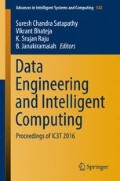Abstract
Events extraction is a significant and interesting task in the field of Natural Language Processing (NLP). Basically events are the dynamic occurrences, specific happenings, causes or things. An event plays a vital role in narrative of text and also important for many NLP applications. This paper presents a Hybrid/Composite way of events extraction from natural language text. Earlier work of events extractions were developed with rule based approach or machine learning methods. The Proposed hybrid makes use of both machine learning approaches and hand coded rules to extract the events. Experiments were conducted on SemEval-2010 data set, the results obtained shown better precision and recall when compared with the existing methods.
Access this chapter
Tax calculation will be finalised at checkout
Purchases are for personal use only
References
Sohn, S., Wagholikar, K.B., Li, D., Jonnalagadda, S.R., Tao, C., Elayavilli, R.K., Liu, H.: Comprehensive temporal information detection from clinical text: medical events, time, and tlink identification. J. Am. Med. Inform. Assoc. (2013). doi:10.1136/amiajnl-2013-001622
Pustejovsky, J., Castano, J., Ingria, R., Saurí, R., Gaizauskas, R., Setzer, A., Katz, G., Radev, D.: TimeML: robust specification of event and temporal expressions in text. In: IWCS-5 Fifth Int. Workshop on Computational Semantics (2003)
Boguraev, B., Ando, R.K.: TimeBank-Driven TimeML analysis. In: Annotating, Extracting and Reasoning about Time and Events, Dagstuhl, Germany (2005)
Poveda, J., Surdeanu, M., Turmo, J.: A comparison of statistical and rule-induction learners for automatic tagging of time expressions in english. In: Proceedings of the International Symposium on Temporal Representation and Reasoning (2007)
Boguraev, B., Ando, R.K.: TimeMLCompliant text analysis for temporal reasoning. In: Proceedings of Nineteenth International Joint Conference on Artificial Intelligence (IJCAI-05), Edinburgh, Scotland, pp. 997–1003 (2005)
Mani, I., Wellner, B., Verhagen, M., Lee, C.M., Pustejovsky, J.: Machine learning of temporal relation. In: Proceedings of the 44th Annual meeting of the Association for Computational Linguistics, Sydney, Australia (2006)
Chambers, N., Wang, S., Jurafsky, D.: Classifying temporal relations between events. In: Proceedings of the ACL Demo and Poster Sessions, Prague, Czech Republic, pp. 173–176 (2007)
Verhagen, M., Gaizauskas, R., Schilder, F., Hepple, M., Katz, G., Pustejovsky, J.: Task 15: TempEval temporal relation identification. In: Proceedings of the 4th International Workshop on Semantic Evaluations, pp. 75–80, SemEval (2007)
Shou, L., Wang, Z., Chen, K., Chen, G.: Sumblr: Continuous summarization of evolving tweet streams. In: Proceedings of SIGIR, pp. 533–542. ACM (2013)
Guda, V., Sanampudi, S.K.: Rule based event extraction in natural language text. In: Proceedings of IEEE International Conference of Recent Trends in IEEE, pp. 47–51, (May 2016). ISBN 978-1-5090-0773-5/16/$31.00 © 2016
http://semeval2.fbk.eu/semeval2.php?location=download&task_id=5&datatype=trial
Miller, S., Fox, H., Crystal, M., Ramshaw, L., Stone, R., Schwartz, R., Weischedel, R.: Message Understanding Conference Proceedings (MUC-7) (1997)
Strotgen, J., Gertz, M.: Heideltime: high quality rule-based extraction and normalization of temporal expressions. In Proceedings of the 5th International Workshop on Semantic Evaluation, pp. 321–324. Association for Computational Linguistics (2010)
Author information
Authors and Affiliations
Corresponding author
Editor information
Editors and Affiliations
Rights and permissions
Copyright information
© 2018 Springer Nature Singapore Pte Ltd.
About this paper
Cite this paper
Guda, V., Sanampudi, S.K. (2018). A Hybrid Method for Extraction of Events from Natural Language Text. In: Satapathy, S., Bhateja, V., Raju, K., Janakiramaiah, B. (eds) Data Engineering and Intelligent Computing. Advances in Intelligent Systems and Computing, vol 542 . Springer, Singapore. https://doi.org/10.1007/978-981-10-3223-3_28
Download citation
DOI: https://doi.org/10.1007/978-981-10-3223-3_28
Published:
Publisher Name: Springer, Singapore
Print ISBN: 978-981-10-3222-6
Online ISBN: 978-981-10-3223-3
eBook Packages: EngineeringEngineering (R0)

